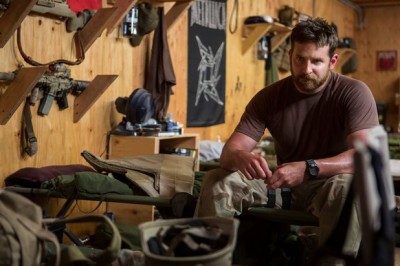Hollywood: Clint Eastwood’s “American Sniper” and Atrocity Porn

If ever the direction of a film and the shape of a particular narrative of US history, as written by, say, the fiction set on Fox News, could come together, then American Sniper is it. Not that you will have director Clint Eastwood, screenwriter Jason Hall and main actor Bradley Cooper agree.
It all begins with a view of history seen through the eyes of the late Navy Seal Chris Kyle, deemed one of the US Army’s deadliest snipers who served on four tours of duty in Iraq. It is from that preserve that the cinematic account springs from, guided by the memoirs titled American Sniper: The Autobiography of the Most Lethal Sniper in US Military History (2012).
クリス.カイルの自伝American Sniper.
Eastwood’s choice of conflict is excruciatingly cruel, an example of naked force exercised on false pretences. It was a war that commenced with a deception, marshalled against the dictates of international law. The Bush administration, doing its level best to imaginatively read available intelligence, invaded Saddam Hussein’s Iraq, assuming it had those fabled Weapons of Mass Destruction (WMDs). The conflict served to destabilise not merely a state but the Middle East, unleashing the Sunni-Shiite fault line with incandescent fury and laying the ground for a future fracturing of the state. The Islamic State, to name but one force, has profited immensely from the zealous, foolhardy exercise.ISISは熱心で無謀な行為から多くの糧を得た。
That leaves the world view of Kyle, which is less that of geopolitical strategist than soldier patriot immersed in his job. What, then, is he fighting? “Savage despicable evil,” storms Kyle in his autobiography. “That’s what we were fighting in Iraq.” As for why the United States was there, the mindset of the liberator rapidly becomes that of the avenging killer. “They hated us because we weren’t Muslim. They wanted to kill us, even though we just booted out their dictator, because we practiced a different religion than they did.”イラク人、卑しむべき野蛮人を殺して当然。彼らは憎んでいる。おれたちはイスラム教徒ではないからー。奴らの独裁者やっつけるためにきたのに奴らは俺たちを殺したかった
Eastwood, and Hall, insist that Kyle’s world is divorced from that of the political. In Eastwood’s words, “Pardon me for sounding defensive, but it certainly has nothing to do with any (political) parties or anything” (Toronto Star, Jan 13). Hall graces Kyle with the status of a firm believer and emphasised how it “cost him his physical health, his mental health and almost cost him his family” (Time Magazine, Jan 21). Patriotism, in short, is tragedy.Kyleを政治から切り離そうとする監督。精神的身体的なたいへんさや家族を犠牲にしたことなど愛国心はつまり悲劇である。
Elevating the malformed views of Kyle, ones best kept at home, to the level of myopic patriotism doesn’t diminish its resounding shallowness. Manifest destiny needs its recruits, and Kyle performed that mission with uncritical thrill. His autobiography constituted an unvarnished apologia for an illegal invasion, a justification filled with blatant inaccuracies about finding “barrels of chemical material that was intended for use as biochemical weapons,” and pieties about misguided Muslim “savages”. He does confess to drawing the line somewhere – not shooting people, for instance, with Korans. “I’d like to, but I don’t.”つま理機械的に軍務を遂行した兵士の男がいるだけだ。戦争への介入に疑問をもたなかった。事実関係の嘘も彼には問題がなかったことを意味する。殺すターゲットに何らの配慮がない。戦争においてはそれが事実だろう。機械的に敵を数多く殺すことが任務なのだから、正当性など問う形而上学的な問いはありえない。
The chest-thumping bravura about a sniper boasting of 160 kills can leave room for Augustinian reflection about the heaviness war can bring, but Kyle doesn’t allow it. There is no room for reflecting about the people he is dispatching, no amateurish anthropology or insight. There is, in fact, a distinct lack of pathos, a sense that the sniper is merely a child gone mad with his lethal toy fighting under the Stars and Stripes. “I only wish I had killed more,” he says in American Sniper.ペイソスのない事実。星条旗の元に致死にいたらしめるおもちゃをもったほんの狂った子供の感覚。”もっと殺せばよかった。”
Duty is everything, and duty is what excuses everything. Kyle’s first kill with a sniper rifle, was a woman, who walked out of a house fifty yards away from an approaching Marine convoy. She seemed to be drawing out a concealed grenade. “It was my duty to shoot, and I don’t regret it. The woman was already dead. I was just making sure she didn’t take any Marines with her.”義務がすべてで、義務がすべてを容赦する。
Eastwood should certainly be allowed cinematic latitude, but he does not seek to improve upon the subject matter he has. (Is it actually possible?) And there are a host of defenders happy with the clipped version they have. The conservative heavies, such as Rupert Murdoch, have been busy targeting the likes of Seth Rogen and Michael Moore for an apparent lack of sympathy, either about the role of snipers in general (cowards, for Moore) or parallels with Nazi propaganda on snipers featured in Quentin Tarantino’s Inglourious Basterds (the subject of Rogen’s comment). “Hollywood leftists trash American Hero, show how completely out of touch they are with America. Bravo Clint Eastwood!” (Hollywood Reporter, Jan 23).
映画の自由裁量は許されるがそうしなかったイーストウッド。保守派は評価し、リベラルの評価は低い。その中でハリウッドの左翼はアメリカンの英雄をごみにすてる。ブラボー!と監督を称える声も!
There is even a sympathetic nod from the History Channel, which has mutated into the Channel of Non-History. Christopher Klein sports an article on the site describing Kyle’s drinking, depression and the creation of the FITCO Cares Foundation in 2011 to encourage exercise equipment and counselling for veterans (History.com, Jan 21).
But Eastwood insists on grouping the sniper of his portrayal with other personnel, some of whom bore heavy consciences. He speaks of, “These fellows who are professional soldiers, Navy personnel or what have you, go in for a certain reason… and there’s no political aspect there other than the fact that a lot of things happen in war zones” (Toronto Star, Jan 13). Kyle doesn’t quite make the grade.
As instruments of state, soldiers remain political extensions, whether Eastwood wishes for them to be otherwise. Instead, he tends to, in the words of Matt Taibbi, turn his subject into the nutritional value of baby food, where the narrative is purposely emptied of broader significance (Rolling Stone, Jan 21).国家の道具とし兵士は政治の延長(範囲)内に留まる。イーストウッドがそうではないように望んだにしろー。深遠な意味性を空虚にしている。ベビーフッドの栄養価値の程度に。(映画を見ないとわからないのですがたぶんみないでしょう。)
As for Kyle himself, he was far from having the nutritional value of baby food. He enjoyed killing and made no secret of that fact. “I loved what I did… It was fun. I had the time of my life.”殺しを楽しんだKYLEである。
Dr. Binoy Kampmark was a Commonwealth Scholar at Selwyn College, Cambridge. He lectures at RMIT University, Melbourne. Email: bkampmark@gmail.com
Bushの戦争は大量破壊兵器がなかったにも関わらず、十字軍の戦争にみたててイスラム教徒の虐殺に狂奔した。その中で狙撃手がイラクに従軍して書いた自伝をもとにつくられた映画だが、戦争そのものの非人道的な世界を嘘で固めたアメリカの戦争介入があり、そこまで掘り下げた狙撃手の物語にはなっていない、ということだろう。疑いがなくイスラム教徒=憎むべき否定すべき存在としてみなしているKYLEがいる。
以前アメリカに留学中、ライフルや短銃を実際に撃ったことがあるが、アメリカでは射撃場があり、ライフルや短銃を借りて実際にターゲットを撃つことができる場所があり、野球やゴルフの練習場のような感覚で入れる。誰でもがライフルに関単にアクセスできる社会である。ターゲットが生身の人間になってもおかしくない環境。簡単に手に入れることができる。戦場で、射撃で人を殺すことは、快楽殺人にもなるのかもしれない不気味さが漂っている。



















